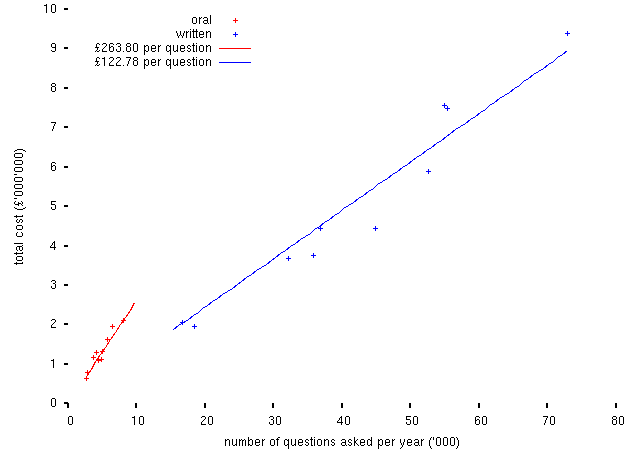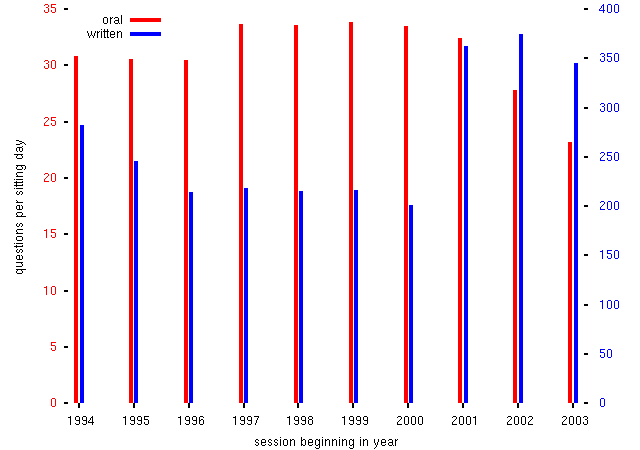It is frequently remarked (by which I mean occasionally, and only in the sorts of media a politics junkie like me reads) that the cost to the taxpayer of answering each Parliamentary question asked by an MP is some astronomical sum (usually quoted as about four hundred quid). That seems pretty surprising, given that most such questions are pretty asinine (and many that aren't are repeats of previous questions), and that four hundred quid is quite a lot of money, even by government standards.
More worryingly, this alleged cost is occasionally advanced as a reason that MPs should not trouble the government with taxing questions, since they are so costly to answer. No sensible person would give credence to such a complaint, but unfortunately there is evidence that the electorate and the newsrooms of the media are full of senseless people, so this is a real problem. What, you might therefore wonder, is the source for this factlet? (To be fair, probably none of my half-dozen readers have wondered this, but do play along anyway.)
It turns out that there is an official source for these figures (though the numbers have been inflated in the retelling): estimates prepared by HM Treasury, themselves supplied as answers to Parliamentary questions, like this one:
Stephen Timms MP: As at April 2004, the average costs of answering an oral parliamentary question and a written parliamentary question were £345 and £148 respectively.
and more data is available on the costs of answering written and oral questions in each of the last few sessions of Parliament. Which all looks very worthy, until you give it a moment's thought. Surely, you might think, whatever bits of the Civil Service are responsible for answering these questions must have some fairly high fixed costs? In particular, the staff and offices must still be paid for, even when there are no questions to answer. And therefore an average cost is not a very useful figure. But that's not how the data look, naively:
(The estimates of £122 and £264 per written and oral question respectively are from linear regression; in both cases the estimate of the fixed costs -- i.e., the intercept of the best-fit line -- does not differ significantly from zero. The government's own estimated average cost is for a single session of Parliament.)
Nevertheless, the government's own estimate for the marginal cost of answering a written question is much smaller than its estimated average cost: £75--
Ruth Kelly MP: [...] The advisory limit [of cost above which an answer to a PQ will be refused] continues to be based on eight times the average marginal cost for written PQs, which is now £75 [...]
or about half the government's quoted ``average cost''.
This can't come from the data which are used to estimate the average cost, since they aren't (see plot above) consistent with the quoted marginal cost and corresponding substantial fixed costs. Perhaps a refinement to the analysis is needed? Most obviously, you might imagine that controlling for the length of each Parliamentary session would make a difference, since session lengths vary quite a bit, and there are only so many questions Ministers can answer in a day, but civil servants must be employed all year round:
-- but in fact this makes no difference: there's still no significant evidence for fixed costs.
So this is all a bit baffling. Using the magic of the Freedom of Information Act, I've asked the Treasury for their methodology and source data for determining the average cost of answering Parliamentary questions; I have no doubt that you, like me, will await their answer with bated breath.
Update: I did receive a useful response to my request, which I have written up in another article.

